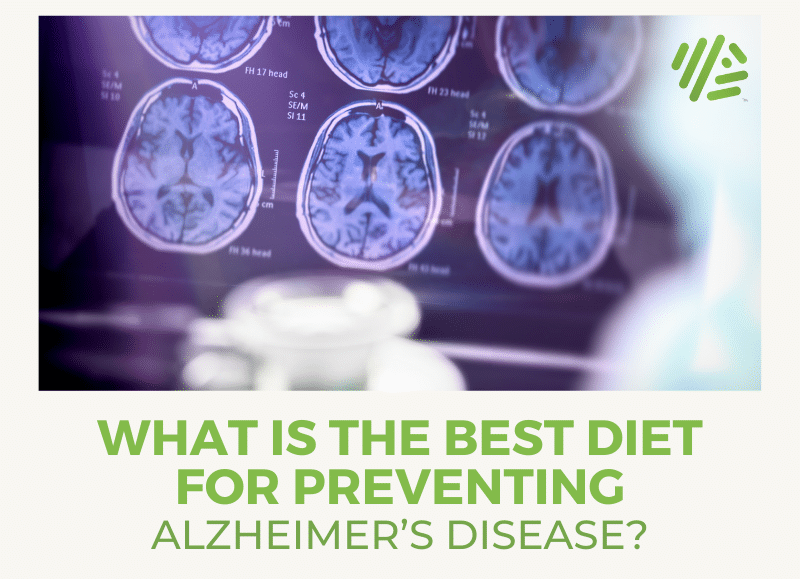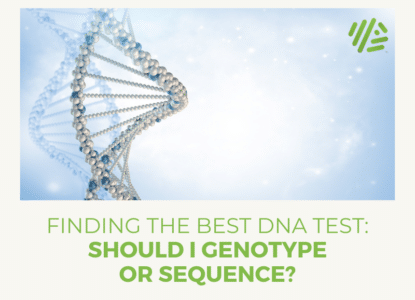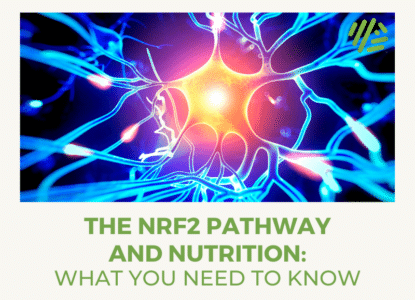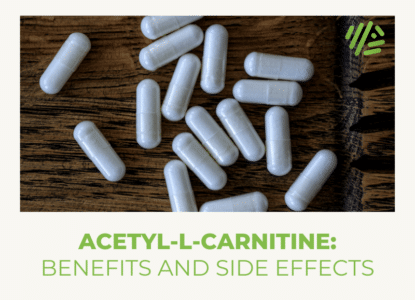What is the Best Diet for Preventing Alzheimer’s Disease?
Genes Mentioned

Contents
Let me start by saying we don’t know. We don’t know what the absolute best diet for preventing Alzheimer’s disease in all people. Nutrition science is often an inexact science. We simply do not have controlled trials that put group A on one diet for 25 years and group B on another diet for 25 years, which is the type of intervention you would need to make definitive statements.
What we can do is look at genetics as well as the ways that diet impacts important biomarkers and guide nutrition decisions using scientific consensus on health issues such as high blood pressure, cholesterol, and liver function.
If these basic building blocks of health are showing red flags, it is also a red flag for your brain. As such, any diet aimed at preventing Alzheimer’s disease should use a personalized approach focused on keeping important biomarkers in a healthy range. One of the important genetics markers we use to personalize diet at Gene Food is ApoE.
Gauging genetic risk
If you’re looking for the best diet to prevent Alzheimer’s, you should be aware that a variant in the ApoE gene, called ApoE ε4, increases the risk for developing Alzheimer’s Disease considerably.
See also: Can 23andme accurately tell us our ApoE ε4 status?
- In most cases, those carrying one or two copies of ApoE ε4 will have to be more careful about dietary fat intake, emphasizing bursts of good quality omega-3 fats and excluding high saturated fat foods altogether.
- This is the case because ApoE ε4 carriers are more likely to absorb cholesterol and to see their LDL-C levels rise when they eat a saturated fat rich diet.
- In turn, elevated LDL-C and ApoB are associated with significant increase risk for early onset Alzheimer’s (EOAD) and Alzheimer’s in general.
- Let’s quote a new (2019) JAMA study that looked at what factors drive risk for early onset Alzheimer’s as well as Alzheimer’s later in life:
Elevated LDL-C levels were associated with higher probability of having EOAD
In late-onset AD, elevated circulating cholesterol levels increase AD risk even after adjusting for the apolipoprotein E ε4 (APOE E4) allele
By contrast, someone with better heart health genes may get away with a diet that is higher in fats because not everyone sees huge upticks in cholesterol when eating saturated fat.
The key is to work with a physician to learn whether you see upticks in cholesterol when eating a high fat diet. If you do, change diets. The JAMA research I cite above is a good indication that most ApoE ε4 carriers are not well suited to Paleo and Bulletproof butter coffee style diets because the ApoE ε4 population are the ones who are more likely to see major elevations in cholesterol when eating higher fat diets. This is not to say that elevated cholesterol guarantees you will develop Alzheimer’s, however, we are talking about reducing risk and sky high cholesterol is clearly not helpful.
Test, don’t guess
The message of this post is – test, don’t guess. Know your numbers and how they are impacted by different dietary protocols. If you’re on a high fat, low carb diet to “protect your brain,” but you’re walking around with elevated LDL-C and high blood pressure, you’re likely increasing risk.
Conversely, if you’re a heavy bread and refined carbohydrate plant based eater and consistently have high triglycerides and insulin resistance to show for it, you’re not decreasing risk because you are on a vegan diet.
The best diet for Alzheimer’s takes into account the metabolic predispositions of each individual and crafts a diet aimed at keeping both blood sugar and cholesterol in a place that makes your doctor happy.
Know your cholesterol levels
Very often, those with the ApoE ε4 genotype have hypercholesterolemia (high cholesterol), which in turn can boost the production and accumulation of the toxic amyloid plaques that lead to dementia. 3 4 5 6
You may have heard about the “new thinking” on saturated fat – namely that fat in the diet doesn’t cause heart disease and that sugar is the root of all evil. Well, there is some truth to that line of thinking. Sugar, and the high triglycerides and diminished liver function that come with sweets, are deadly to the health of your brain. 7 However, as we have established above with the JAMA study, elevated LDL-C is a threat as well.
ApoE ε4, saturated fat and inflammation
- ApoE ε4 carriers are more likely to have an inflammatory reaction to high fat diets.
- When ApoE ε4 carriers eat foods like fatty beef, eggs and cheese, their bodies make more cholesterol and ApoB count tends to rise.
- These changes in blood lipids contribute to poor cardiovascular health that over time can contribute to dementia.
- For example, this study, which appeared in the peer reviewed Journal Nutrients in 2018. Researchers found that carriers of one ApoE ε4 variant had a much greater reduction (when compared with ε2 and ε3 carriers) in LDL-C and total cholesterol when they switched away from saturated fat and instead ate low GI carbohydrates and a lower fat diet.
Plant based diets and Alzheimer’s risk
Note: not everyone has this response, but if you are someone who sees elevated LDL-C when you eat a high fat diet, a whole foods plant based diet is probably the right direction for you. If you inherited the ApoE ε4 genotype, you should take special care to follow a heart healthy diet avoiding saturated fats and other foods that promote major upticks in LDL-C, as changes in the LDL:HDL ratio are associated with increased ApoE expression in the brain. 8
In fact, many of the plant based diets in our nutrition plan scoring system, such as Villager, Okinawan, Wayoan, and Vegetarian are often scored that way, in part, because of an ApoE ε4 marker. In practical terms, this means eating Vegan at least 3-4 days a week and completely avoiding butter, ice cream, fatty meats and supplements like MCT oil.
MCT oil and dementia
Note, that MCT oil has actually shown promise in some studies for treating dementia (once it has already set in), but like fish oil, doesn’t appear to help ApoE ε4 carriers. Researchers suggest that avoiding excess saturated fat and taking in enough healthy Omega 3 fats (so don’t skip the wild salmon) may decrease the risk or postpone the onset of dementia for this group. 9 10
So, the lesson here is if you have high LDL and cholesterol, a diet that emphasizes whole plant based foods with the addition of some wild salmon or good quality cod liver oil is the best diet for Alzheimer’s prevention, especially if you have ApoE ε4. Please do note that a plant based diet does not mean eating refined grains! Flour based foods that spike blood sugar can be just as deadly to brain health as are cheese and red meat for the ApoE ε4 group.
Insulin resistance and dementia
There is evidence that insulin resistance, characterized by an inability to maintain healthy blood sugar levels can contribute to dementia. 11 Vegetarian populations do develop dementia. 12
Mediterranean diet and Alzheimer’s prevention
And while ApoE ε4 carriers should avoid the Bulletproof diet, and other diets high in saturated fat, it is important to keep in mind that avoiding saturated fat does not necessarily mean cutting out all fat.
- Publicly funded research by the NIH has shown that a group following a Mediterranean diet had a slower build up of the amyloid plaques that cause Alzheimer’s than did a group eating a standard Western diet high in refined sugar, red meat, and saturated fat.13
- The Mediterranean diet is essentially a plant based diet plus a few servings a week of fish, and occasional goat or sheep cheese and small servings of high quality lean poultry.
- However, not everyone agrees that ApoE ε4 carriers should eat poultry. Dr. David Gundry, author of The Plant Paradox, recommends that ApoE ε4 carriers remove poultry entirely from their diets.14
- This balanced approach to regulating cholesterol levels may explain why the traditional Mediterranean diet is associated with a reduced incidence of Alzheimer’s disease (as well as several other disorders).15 16
- For example, in another small study, patients with Alzheimer’s following a Mediterranean diet improved survival almost 5 times compared to those on a normal Western diet. 17
- But once again, due to a lack of understanding about the exact causes of Alzheimer’s we can’t home in on exactly why this diet is beneficial.
- Foods rich in flavonoids and polyphenolic compounds — like fruits, vegetables, red wine, and tea — are also thought to have a protective role due to their antioxidant and anti-inflammatory activity. Vitamins from the B family and vitamin D will exert a benefit, too. 18
- However, it is important to note that these recommendations seem to address Alzheimer’s prevention broadly. Dietary interventions can be more difficult for ApoE ε4 carriers. 19
What about ketogenic diets?
We’ve established that high saturated fat diets are not a great idea for those with ApoE ε4. But for a more detailed break down, take a look at Aaron’s post specifically on the topic of whether ketogenic diets can prevent Alzheimer’s.
Does Vitamin E slow Alzheimer’s progression?
Increased oxidative stress is said to be a risk factor for Alzheimer’s disease, which has led researchers to look at antioxidants, like Vitamin E in the treatment of Alzheimer’s, but not necessarily prevention. After promise in mouse models, some trials have looked at high dose Vitamin E for Alzheimer’s patients, however, the results have been mixed. Having said that, it appears the pro Vitamin E camp may be winning out. The Alzheimer’s Disease Cooperative Study Group (ADCS) supports the use of high dose Vitamin E with Vitamin C for the treatment of the disease. This recommendation is based on this large clinical trial. To quote the study:
Over the mean (SD) follow-up of 2.27 (1.22) years, participants receiving alpha tocopherol had slower decline than those receiving placebo as measured by the ADCS-ADL. The change translates into a delay in clinical progression of 19% per year compared with placebo (approximately 6.2 months over the follow-up period). Caregiver time increased least in the alpha tocopherol group.
Can fish oil help with ApoE ε4?
You may have read about some clinical trials that show the omega 3 fatty acids found in fish oil demonstrate promise for easing dementia symptoms. This is true. Interestingly, there is some speculation in the literature that the rise of Alzheimer’s has mirrored the corresponding increase in omega 6 ratios to omega 3 ratios. However, no benefit was found in ApoE ε4 carriers who took fish oil supplements. 20
Instead, ApoE4 carriers seemed to do best with simply eating wild fish, but Dr. Rhonda Patrick’s recent paper sheds some light on the best omega-3 strategy for ApoE4 carriers. Her position is that getting fish oil in phospholipid form, which means krill oil, is the key for ApoE4 carriers. 20
Final thoughts
- Early onset Alzheimer’s has a strong genetic risk element, with many individuals already aware of the elevated risk.
- Although it is just that, an elevated risk, not a diagnosis, it is understandable that those with ApoE4 especially will want to make lifestyle changes to protect against disease development, or severity.
- Unfortunately given our relatively poor understanding of what triggers Alzheimer’s disease onset, none of us can say for sure what the best Alzheimer’s disease prevention regimen is for any one individual.
- Be very wary of any healthy guru, MD or otherwise, selling a one size fits all diet for brain health. If there is one thing the science in this field has taught us, it’s that there is no one size fits all for Alzheimer’s prevention.
- If it was my family or a friend asking my advice, I would suggest working with a doctor that administers Boston Heart Diagnostics panels and tailoring diet to get, and to keep, as many biomarkers markers as possible in the green on those tests. Especially, homocysteine, ApoB, LDL-C, cRP, and insulin. Good luck!




Excellent article. One edit: Dr. Gundry’s first name is Steven, not David 🙂
I am in my 50s and have APO e3/e4.
I don’t have, and never have had, high cholesterol. Saturated fat has not been a problem for me, and I seem to do better on it than on other kinds of fats. I don’t go overboard at all with it, and I don’t eat much red meat because I just don’t like it (although it’s healthy for me and I need the iron and protein), but I think probably eating more saturated fat would be healthier (for me in my particular case) and I would not want to go 4 days a week without it, on a vegan type of diet. Maybe that’s because I already was a vegetarian for 12 years in mid-life – and getting away from that diet (stopping eating a number of grains that I discovered were causing me digestive issues and join pain, eating a tiny bit more meat protein every day) has helped my health.
A couple of years ago, when I first learned about my APO e4 allele and looked into the suggestions at the time, I tried NAD, curcumin, grape seed extract, and niacin:
* Taking one “half” dose of a high-quality, recommended NAD gave me an astonishingly-bad 2-day splitting headache and wiped me out — I vowed never to try it again.
* I took a small amount of curcumin (1 500 mg capsule daily) for a few months and even though it helped a lot in several ways — improved my mood, increased my positive dreaming while sleeping, dramatically improved my joint pain — it caused a lot of unwelcome side effects and I had to stop taking it.
* Taking a small dose of grape seed extract must have revved up my male hormones (I am female) and it quickly made bristly, thick facial hair grow on my chin and upper lip. (I later learned that it’s known to be a beard-booster.) When I stopped taking it, the beardy growth slowly subsided on my face.
* I used to take a small dose of niacinamide as my form of niacin supplement (for decades), but I several years ago I learned that there are quite a number of issues with niacinamide and I decided to avoid it, so I tried a couple of other newer “trendy” forms of niacin and I didn’t do well AT ALL with them, then I switched to nicotinic acid (just “plain” niacin), which I can barely tolerate in terms of the flush effects even though I’ve taken it consistently for several years — I get flushing on doses as low as 16 mg (yes, sixteen milligrams). I have to buy it in 100 mg tablets so I can cut them into 6 pieces to get 16 mg each, because I can’t fiddle with tipping out a few bits of powder from the nicotinic acid capsules that often have 500 mg or more in them. Other than the flushing, it seems that this tiny dose of niacin I do okay with, and I probably feel better on it than I felt on the niacinamide, but it’s very subtle.
However, I seem to have a HUGE sensitivity to the niacinamide that is in an increasing array of topical products (like face wash, face lotion, skin lotion) and when I have a bit of skin contact with one of those products, it will cause me a red skin rash and feeling of heat (on that area of skin that was touched by the niacinamide-containing toiletry) that lasts for an hour. There isn’t much on the internet about niacin topical sensitivity, but I did find a few mentions on the internet and apparently it’s more common than one would think. From these different experiences, I conclude that I probably am sensitive to niacin internally and externally, but I don’t want to go without niacin entirely as a supplement because I take a small dose of many of the other B vitamins 5 days a week, and I don’t want my Bs to be imbalanced (which I experienced about 10 years ago when I was taking a highly-rated supplement that had a very unbalanced ratio of Bs and it caused me problems until I figured it out).
Therefore, the main nutrients that are recommended to help APOE e4 people I don’t tolerate very well.
There is a website and discussion group for APOE e4 people – I haven’t visited it in about a year, but it had good info at that time.
When I found out this was one of my alleles (through 23andme that I did 7 years ago), I concentrated on researching other issues that were more pressing to my health for the first few years, and I only stumbled on the APOE e4 result a couple of years ago. After I realized that this is an important thing to know about my health and what it might involve down the road, I mentioned it to my doctors (all MDs – GP, endocrinologist, neurosurgeon) and the first 2 told me they’ve never heard of APOE e4 and they couldn’t address it, the third didn’t say whether or not they had heard of it specifically but replied, “We are all going to get Alzheimers, so it doesn’t matter and there isn’t anything you can do about it, aside from living a healthy life” (um………….). I switched endocrinologists and thankfully the new one had heard of APOE e4 and understood the significance of it, but after 2 visits to that person (which were dealing with more pressing health issues), my insurance company changed and I lost ALL my doctors. I don’t have high hopes to find new ones that know much about it or care (I live in an area of the US that isn’t entirely backwards but it isn’t at all forwards.)
It’s amazing that a lot of MDs haven’t even heard of APOE e4 and don’t care to find out more about it when a thoughtful, educated, responsible patient brings it up as an important genetic finding. Whatever — I’ve had to self-diagnose and fight for treatment for some other major things in the last 10 years; it’s ridiculous.
I have read a lot of articles on apoe4 since finding out I have one allele for it and would like to minimize my risk. I am 66 years and still working full time in IT. Besides eating as much unprocessed food as possible one thing that strikes me is that in western society we eat too much and too often. I’ve done intermittent fasting off and on for a few years,but after reading Dr Bredesen’s book, I try and have a 12 hr fast every day and every 2-3 weeks I do a 20-24 hr water fast which I find rather exhilarating. Occ go for 48 hrs.
I believe I got the allele from my mother’s side, but there is no documented Alzheimer’s on either side of the family.
I also uploaded my raw 23&me data to get a full report. Interestingly there were a couple markers for increased cognitive ability so hoping my epigenetics and genetics work for me.
thank you for this article, as a APOE 3.4, I am looking to change my diet. I have worked out every day for the last 40 years both resistance trainng and running. No smoking, no hypertension, no diabetes and have the same waist size from high school. I have been eating a low carb diet with lots of saturated fat.
2 things I will need to change
1. Go vegetarian with whey protein to prevent muscle loss
2. Stop 2 supplements that I take, fish oil and MCT oil. I already to take the ones you recommend.
I wouldn’t go vegetarian. I’m 4/4 and have been doing Mediterranean diet with lots of SMASH fish. My Boston Heart Labs are all in the green and I also supplement phospholipid PC and krill oil as well as a host of other nutrients to keep all markers in optimal range.
Excelente articulo colega!! Felicidades
Excellent article. Congratulations!!!
Very interesting and helpful articles.